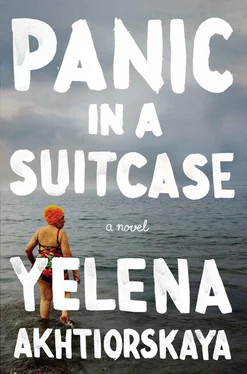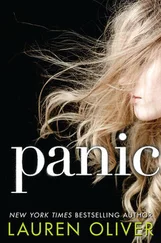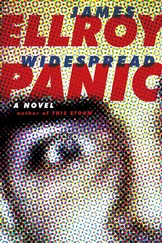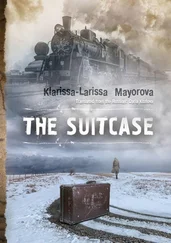It lasted several minutes and was more of a drizzle. Then the clouds parted and some rays dropped down, weak ones, as it was getting late.
People spilled out of cafés, emerged from behind corners, out of potholes and ditches, returning in throngs. You’d think they were made of sugar, thought Frida, to be so afraid of a little rain. A chill in the air was taken advantage of by young men, who eagerly wrapped themselves around any pair of bare shoulders in the vicinity. Shivers convulsed Frida’s own shoulders, on which every hair stood at attention, yet she didn’t pick up her pace as she waded out of the water, taking steps with deliberate slowness, afraid of what she’d find on shore.
She had no money (stolen) but she did have pants (discarded), which was more than could be said for most of the girls boarding the tram. Young women in this city evidently commuted free of charge. Though the term commute implies obligation, routine, dreariness, whereas these women were composed of light particles that simply floated (or took the tram) from one location to another, likely never to revisit the same place twice, not least of all because these women had the memory spans of cats and approximately eight minutes after arriving at their destination would have forgotten all about a point of origin. Frida’s free ride wasn’t the same as theirs — they got by on their shapely, tanned legs, she got by on pity. Though the truth of the matter was that the tram conductor had long ceased admiring legs or feeling pity, now interested only in finishing up his shift and getting back to his homing pigeons.
• • •
THE WIFE STOPPED GOING about her business (a crossword puzzle) in order to relay a message. She wanted to exude contentment but was sweating buckets. The city was taking its toll, and she hadn’t even gone outside yet.
A message for me? said Frida in alarm, seeing before her eyes, in rapid succession, a mushroom cloud, the scene from Terminator 2 when the children in the playground disintegrate, a tidal wave with claws in the style of Hokusai, a many-car pileup, and a collapsing skyscraper. She took a few steps into the kitchen to sit down, overcome, suddenly, by exhaustion.
The wife’s attention was drawn to the floor. Stop right there! she screamed. Look at the grime you’re hauling in here! Where are your shoes?
By the time Frida had managed to mouth, I lost them, her feet were planted in a plastic tub of warm water while a pungent mop made concentric circles around her.
Yes, said the wife, a message, from Aleksandr Pavlovich.
Sanya came by?
He called. Asked to speak with his father. There’s a forgetful gene in your family if you ask me. Then he said that he also wanted to talk to you.
He could’ve called my cell — Pasha gave him the number.
He said he tried. A man answered and shouted at him.
That can’t be, said Frida. The wallpaper’s domino pattern began to blur and the wife’s face to rearrange like a game of Tetris. Frida was suddenly aware of the universe, in all its strangeness and inescapability. You run one way and it’s the universe, the other way and universe. The wife was supporting her elbow when she came to, having realized that after putting on her pants post-swim, she’d no longer felt the cell phone’s hardness in her back pocket. Of course this didn’t rule out the possibility that she was being followed.
The wife, who proved to have very large teeth and hazel eyes with velvety lashes, didn’t require an explanation for Frida’s little spell, preferring, in fact, not to have one. Frida was now standing upright and no longer draining of color rapidly, which the wife took to signal the episode’s end.
He probably wanted to say that he’s going to pick me up, said Frida. Did he give a time? I have to get dressed! What do I wear? I’ll be late. Should I meet him somewhere, or is he on his way here?
None of this, said the wife. The wedding’s back on. That’s what he called to say. Now, if you ask me, all this back-and-forth, it doesn’t bode well.
Sanya had reconciled with Nadia — yes, just like the mother, a particularly common coincidence nobody was adequately disturbed by. This joyous news came, however, with a downside: Sanya wouldn’t get a chance to see Frida prior to Sunday’s event. The couple had decided that there was too much noise around them and that in order to start their marriage on the right footing they needed quality time alone before the nuptials, something that just wasn’t possible in Odessa, which might seem like a big city to a foreigner like Frida but was actually a village where going out for eggs meant that in exactly three and a quarter hours Olga Nudnaya, who had Gypsy blood and lived on the opposite side of town, would call to ask what the matter was, as there were bags under your eyes and you were wearing the same shirt from yesterday. Besides, Sanya was something of a celebrity, not just as his father’s son but on his own merit as filmmaker and bon vivant. The news of the wedding’s reinstatement was sure to spread like wildfire. They were off to Yalta for a few days to bask in the Crimean sun and get a dose of the savage Tatar spirit, and lamb. Frida would have to take a rain check on Arkadya, which he’d make good on if she was still around when they got back from their real honeymoon, a month of island-hopping in Greece.
• • •
FRIDA CALLED HOME. Her mother picked up and failed to sound sufficiently enthusiastic.
I’m very enthusiastic, said Marina, it’s just four A.M. on Tuesday.
Aren’t you worried about me? Don’t you care how I’m doing?
I was trying to give you your space—
Well, if you care to know, I’ve been robbed! Frida’s face grew piping hot, and her mouth twisted open. There was a brief pause as the pressure built inside her head, climbing steadily until with a rubbery croak all that air was released, alongside a deluge of mucus and tears.
Change your ticket and come home this minute, said her mother.
Frida whimpered for a little longer, then stopped abruptly. Please don’t give me orders, she said.
What did they take? Are you hurt?
Only my cell phone and some of the stranger’s money.
What stranger? Fridachka, come home. Take the knife out of my liver.
Frida took an exasperated breath. I’m fine, Ma. In fact, I’ve never been better. I only called to say hello. But now I need to be getting back.
Wait — tell me more. Have you been to the dacha? How are the raspberry—
I can’t talk! I have to get back!
Get back to what?
To sitting in Pasha’s bathtub fully dressed. She stretched out her legs and lay back, finding herself under a zigzag canopy of Sveta’s tiny, lacy delicates, which had been squeezed aggressively and hung to dry. Pasha was, after all, a sensualist. Packaging made a difference to him. You could tell by one glance at Sveta’s shoe rack. There wasn’t a single sensible pair — but there was nothing sensible about these people. What so infuriated Frida about this place was that the rules of proper living were neither enforced nor acknowledged. And yet the feeling she’d had at the dacha, that this trip would serve to realign the facets of her life at home, stimulate the machine into motion, was gone. How convenient if that’d been the case — she’d go on battling anatomy textbooks, look back with fond bewilderment on her visit to Odessa, and that would be that. Trying to become convinced of the rightness of this outcome was useless. She already knew what had to be done.
She had to miss that flight. By the time the thought was articulated, it was too far along to be dismissed. There’s a delay, thought Frida, between the lurking forces that brew into events and the events as they unfold for our viewing pleasure, like the universe equivalent of the delay between the windup effort and the automatic chatter of a pair of mechanized plastic teeth. She’d often been accused of not having appropriate reactions, of being zatormozhenaya, existentially blocked, an important word lacking a proper English match; perhaps it was because by the time events actually occurred, they already felt old, as obvious and inevitable as memories, and to react to them adequately required some showmanship. Those resistant to acting, if not biologically incapable of it, were deemed zatormozheniye. But the fact of the matter was that if enough attention was paid to those lurking forces, very few events couldn’t be seen coming from miles away. Therein lay the danger of the delay. It cast a shadow that could be interpreted as fate — but there was no such thing. She wasn’t fated to forget about medical school, to stay in Odessa; to stay was her choice, and most probably a stupid one. If it felt inevitable, it just felt so, the illusion of destiny. When the decision to throw her future down the toilet didn’t pan out, she wouldn’t allow herself solace in the thought that at least it was meant to be so, and therefore she couldn’t plunge headfirst and then pray, relying, as the Brighton Beach real estate developers did, on the higher powers to take care of the rest. She knew all too well what the end result of such heedless faith looked like — crumbling stucco, torn plastic, exposed innards, weathered rot, and eventual collapse. If she was to go through with this, really go through with it, she needed resolve, tenacity, and, more pointedly, a purpose.
Читать дальше












